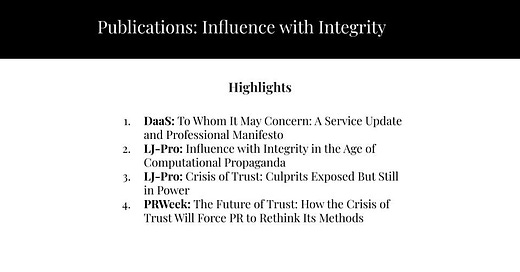Below is a sample of my published work related to “influence with integrity”, starting with my most recent professional manifesto.
To Whom It May Concern: A Service Update and Professional Manifesto
Published on DaaS | November 13, 2024
Do not hire me to create better solutions. Hire me to discover better problems.
Hire me to help you recognize your solutions as problems and your problems as solutions.
Don't hire me to help you win. Hire me to be defeated, in Rilke’s words, by ever-greater things.
Don't hire me to help you respond to the petty urgencies of corporate life. Hire me to help the corporations you serve grow out of their pettiness.
Don't hire me to provide prefabricated responses to predefined issues. Hire me to define the issues obstructing your path to better problems.
Influence with Integrity in the Age of Computational Propaganda
Self-Published on August 11, 2018
When Edward Bernays rebranded propaganda as public relations (PR), he made systematic influence more palatable, but not more sustainable. The industry Bernays created has found itself on a sure path to increasingly marginal relevance ever since systematic influence started to lose ground to algorithmic influence or computational propaganda, and businesses formerly known as PR and advertising firms yielded the center of the influence matrix to the ominous-sounding FAANGs (Facebook, Apple, Amazon, Netflix, Google).
Crisis of Trust: Culprits Exposed But Still in Power
Self-Published on February 2, 2018
My essential argument then was that most of the work done under the banner of public relations was either ineffective and counter-productive or unethical. Now in 2018, the argument is overdue for an update because the effectiveness of PR-as-conceived-by-Bernays has spiked sharply ever since FAANGs (Facebook, Apple, Amazon, Netflix, Google) emerged as the new captains of humanity's collective consciousness. The argument also warrants an update because, for anyone inclined to take ethics seriously, there's now a new generation of leading lights of PR who have one thing in common: none of them ever worked in PR.
The Future of Trust: How the Crisis of Trust Will Force PR to Rethink Its Methods
Published in PRWeek on January 23, 2012
We enter 2012 with the world around us mired in a crisis of trust. Consider the latest evidence. If truth and candor truly form the backbone of our work, then we need to isolate and explicitly disown the practices that undermine these values. The solutions are kind of obvious; if applied consistently, they work.
Investors in Innovation: Survey of Alternative Energy Investors and Analysts
Published at Waggener Edstrom on February 2, 2009
Despite a deeply challenging business climate, these survey findings suggest that the financial community still views alternative energy companies with a persistent (if somewhat tempered) sense of optimism. While they believe that mainstream media sometimes tends to create unreasonable expectations for the sector, they also recognize that business press in particular can bring an excessively skeptical eye to their coverage.
At the same time, a majority of respondents agree that market forces alone may not be sufficient to drive alternative energy markets on their own, and that there is an important role for government policy to bridge the gap – particularly when there is a lull in oil and gas prices that they do not expect will last. Broad belief that our recent honeymoon at the pump is but a transient phenomenon should come as encouraging news for anyone concerned about a permanent loss of momentum in the sector.
To Speak Or Not To Speak: The Untold Story of Fair Disclosure
Published at Ruder Finn on November 1, 2001
If Arthur Levitt had to write the history of capital markets, he would probably divide the subject into the Dark Ages and the Renaissance. The two eras would be set apart by a watershed event – the adoption, circa 2000, of Regulation FD (Fair Disclosure). Reg FD, as the rule has come to be known, was Levitt’s cherished brainchild, another opportunity to lay down an enduring and positive legacy. In hindsight, though, the rule has arguably proven more divisive and confusing, and on a broader scale, than any other regulatory action by Levitt or his predecessors.
To receive new career-related publications by email, become a free subscriber.




